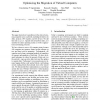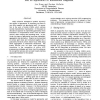3206 search results - page 64 / 642 » How minds can be computational systems |
102
click to vote
JCDL
2006
ACM
15 years 3 months ago
2006
ACM
The development of public libraries may have inadvertently brought the age of marginalia to a close but the advent of digital libraries could revive the practice of marginal annot...
OSDI
2002
ACM
15 years 10 months ago
2002
ACM
This paper shows how to quickly move the state of a running computer across a network, including the state in its disks, memory, CPU registers, and I/O devices. We call this state...
109
click to vote
ICDCS
2011
IEEE
13 years 9 months ago
2011
IEEE
Many distributed software systems allow participation by large numbers of untrusted, potentially faulty components on an open network. As faults are inevitable in this setting, th...
IJCAI
1989
14 years 11 months ago
1989
Many artificial intelligence systems implicitly use notions of granularity in reasoning, but there is very little research into granularity itself. An exception is the work of Hob...
MCU
1998
14 years 11 months ago
1998
The paper extends some of the most recently obtained results on the computational universality of speci c variants of H systems (e.g. with regular sets of rules) and proves that we...


